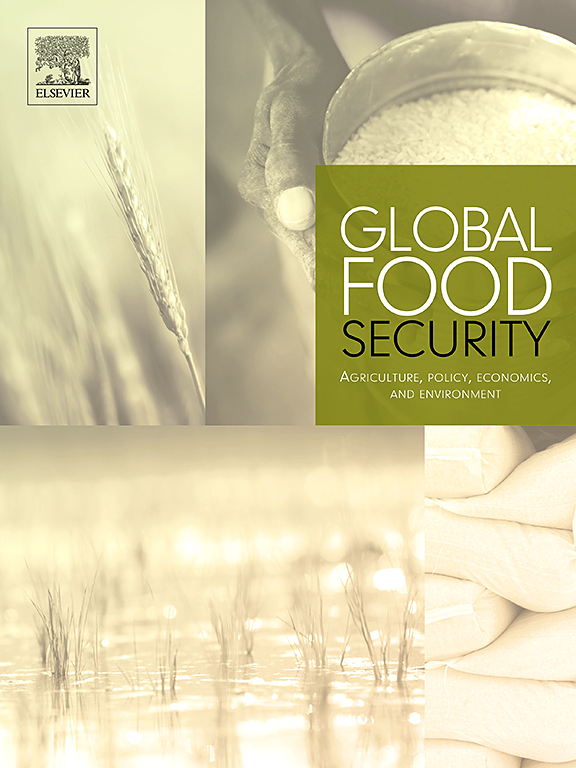Ecological functional diversity predicts nutritional functional diversity in complex agroforests
IF 9.6
1区 经济学
Q1 FOOD SCIENCE & TECHNOLOGY
Global Food Security-Agriculture Policy Economics and Environment
Pub Date : 2025-07-19
DOI:10.1016/j.gfs.2025.100870
引用次数: 0
Abstract
Biodiversity loss and rising noncommunicable disease incidences are among the greatest global challenges we face. These crises are deeply interconnected and shaped by varied food system dynamics, including the prioritization of large-scale, inexpensive food production, at the cost of externalized environmental and human health impacts. Climate change is expected to further exacerbate these challenges. Agroecological systems are increasingly promoted as a viable solution toward more resilient, nutritious, sustainable, and climate-adaptive food systems. However, the mechanisms linking biodiversity and climate sensitive management practices with potential nutritional contributions in these food production systems remain underexplored. In agroecosystems, the functional diversity of ecological traits supports resilience to disturbance and food security, while the functional diversity of nutritional traits influences the system's nutritional potential to support nutritional adequacy and human health. Using a trait-based framework, we quantified ecological and nutritional functional diversity in 48 Indigenous agroforests in Fiji. We found that agroforests with higher ecological functional diversity of response traits exhibit significantly greater nutritional functional diversity, suggesting that managing for ecological resilience may also enhance the nutritional potential of food production systems. These findings offer a novel empirical bridge between ecological function and nutrient provisioning, and highlight the importance of maintaining agrobiodiversity to support both environmental and human health in efforts to transform global food systems.
生态功能多样性预测复合农林业的营养功能多样性
生物多样性丧失和非传染性疾病发病率上升是我们面临的最大全球挑战之一。这些危机紧密相连,并受到各种粮食系统动态的影响,包括以外部环境和人类健康影响为代价,优先考虑大规模、廉价的粮食生产。预计气候变化将进一步加剧这些挑战。农业生态系统作为一种可行的解决方案,正日益得到推广,以实现更具抵御力、营养、可持续和气候适应性的粮食系统。然而,将生物多样性和气候敏感管理做法与这些粮食生产系统中潜在的营养贡献联系起来的机制仍未得到充分探索。在农业生态系统中,生态性状的功能多样性支持对干扰的恢复力和粮食安全,而营养性状的功能多样性影响系统的营养潜力,以支持营养充足和人类健康。使用基于性状的框架,我们量化了斐济48个土著农林业的生态和营养功能多样性。研究发现,响应性状生态功能多样性越高的农林业,其营养功能多样性也越高,这表明对生态恢复力的管理也可能提高粮食生产系统的营养潜力。这些发现为生态功能和营养供应之间提供了新的经验桥梁,并强调了在改变全球粮食系统的努力中,维持农业生物多样性对支持环境和人类健康的重要性。
本文章由计算机程序翻译,如有差异,请以英文原文为准。
求助全文
约1分钟内获得全文
求助全文
来源期刊

Global Food Security-Agriculture Policy Economics and Environment
FOOD SCIENCE & TECHNOLOGY-
CiteScore
20.90
自引率
3.40%
发文量
69
期刊介绍:
Global Food Security plays a vital role in addressing food security challenges from local to global levels. To secure food systems, it emphasizes multifaceted actions considering technological, biophysical, institutional, economic, social, and political factors. The goal is to foster food systems that meet nutritional needs, preserve the environment, support livelihoods, tackle climate change, and diminish inequalities. This journal serves as a platform for researchers, policymakers, and practitioners to access and engage with recent, diverse research and perspectives on achieving sustainable food security globally. It aspires to be an internationally recognized resource presenting cutting-edge insights in an accessible manner to a broad audience.
 求助内容:
求助内容: 应助结果提醒方式:
应助结果提醒方式:


